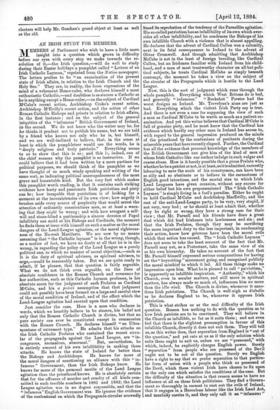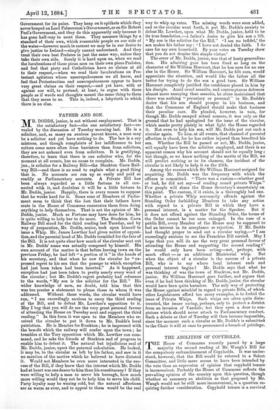AN IRISH STUDY FOR MEMBERS.
MEMBERS of Parliament who wish to have a little more insight into a question which grows in difficulty before our eyes with every step we make towards the re- solution of it,—the Irish question,—will do well to study during their Easter holidays a pamphlet called "Letters of an Irish Catholic Layman," reprinted from the Nation newspaper. The letters profess to be "an examination of the present state of Irish affairs, in relation to the Irish Church and the Holy See." They are, in reality, the loose expressions of the mind of a vehement Home-ruler, who declares himself a most enthusiastic Catholic,—and doubtless is as sincere a Catholic as he is anything except a Home-ruler,—on the subject of Cardinal M'Cabe's recent action, Archbishop Croke's recent action, Archbishop .'kEvillv's recent action, and the action of other Roman Catholic Bishops and priests in relation to Irish affairs, in the first instance ; and on the subject of the general iniquities of the "infamous " British Government of Ireland, tin the second. We do not know who the writer may be, for he thinks it prudent not to publish his name, but we are told by a friend who knows not only who he is, but himself, and we are well-inclined to believe, that, in the sense at least in which the pamphleteer would use the words, he is "deeply religious and truly patriotic." Everything seems to us to show that this is so ; and this i, indeed, one of the chief reasons why the pamphlet is so instructive. If we could believe that it had been written by a mere partisan for political purposes, we should think of the pamphlet as we have thought of so much windy speaking and writing of the same sort., as indicating political unscrupulousness of the most grave and lamentable kind. But the very fact which makes this pamphlet worth reading, is that it contains such striking evidence how hasty and passionate Irish patriotism and piety can be; how incapable that patriotism is of looking for a moment at the inconsistencies of its own view; how angrily it .brushes aside every source of perplexity that would arrest the attention of ordinarily conscientious men, as at least a warn- ing that they might be wrong ; and with how arrogant a self- will and stone-blind a partisanship a sincere devotee of Papal • infallibity can scold at his Bishops and Cardinals, the moment he finds them at issue with himself on such a matter as the moral dangers of the Land-League agitation, or the moral righteous- ness of the No-rent Manifesto. We are now by no means assuming that "the Catholic layman" is in the wrong, though, as a matter of fact, we have no doubt at all that he is in the wrong, in regarding the policy of the Land League as a purely political one, to which no manner of moral objection,—such as it is the duty of spiritual advisers, as spiritual advisers, to orge,—could be reasonably taken. But we are quite ready to admit, if he pleases. that that question is fairly arguable. What we do not think even arguable, on the lines of absolute confidence in the Roman Church and reverence for her authorities, such as this Catholic layman professes, is his absolute scorn for the judgment of such Prelates as Cardinal M'Cabe, and his a priori assumption that that judgment -could not possibly have been formed on a large and careful view of the moral condition of Ireland, and of the effect which the Land-League agitation had exerted upon that condition.
Just consider the case. Here is a man who declares in words, which we heartily believe to be sincere, his belief not only that the Roman Catholic Church is divine, but that no pure society can ever be constituted except in communion with the Roman Church. He declares himself "an Ultra- montane of extremest type." He admits that his attacks on the Irish Catholic Prelates who sustained the recent circu- lar of the propaganda against the Land League, are "in- congruous, anomalous, abnormal." But, nevertheless, he is entirely assured of his own infallibility in making these attacks. He knows the state of Ireland far better than the Bishops and Archbishops. He knows far more of the moral dangers of sanctioning an alliance with this in- famous " Government, than the Irish Bishops know. He knows far more of the personal merits of the Land League agitation than the priesthood knows. He is absolutely certain that for the offences of murder and cruelty of all kinds com- mitted in such terrible numbers in 1881 and 1882; the Land League agitation was in no degree responsible, and that the "infamous" English Government was. He ignores the evidence of the confessional on which the Propaganda circular avowedly based its reprobation of the tendency of the Parnellite agitation. His so-called patriotism has an infallibility of its own which over- rides all other infallibility, and he condemns the Bishops of his own infallible Church with a violence that is almost appalling. He declares that the advent of Cardinal Cullen was a calamity, next in its fatal consequences to Ireland to the advent of Oliver Cromwell. And though admitting that Archbishop McCabe is not in the least of foreign breeding, like Cardinal Cullen, but an Irishman familiar with Ireland from his child- hood, and a man of most trustworthy character on all but poli- tical subjects, he treats Cardinal McCabe as simply beneath contempt, the moment he takes a view on the subject of the circular of the Propaganda which is hostile to the Land League.
Now, this is the sort of judgment which runs through the whole pamphlet. Everything which West Britons do is bad, and generally "infamous." " Buckshot " Forster had the
worst designs on Ireland. Mr. Trevelyan's aims are just as bad. Everything which the violent Irish Party say is true. And there is not even a case for supposing the view of such a man as Cardinal M'Cabe to be worth so much as a patient ex- amination. And yet this writer believes that Cardinal M'Cabe is full of genuine piety, and he must know that the Cardinal has evidence which hardly any other man in Ireland has access to, with regard to the general impression produced on the minds of the priesthood by the confessions of penitents during the miserable years that have recently elapsed. Further, the Cardinal has all the evidence that personal knowledge of the members of the British Government can give him of the kind of men of whom Irish Catholics like our author indulge in such vulgar and coarse abuse. How is it barely possible that a pious Prelate who, whether he be a patriot or not, is at least, as it is admitted, earnestly labouring to save the souls of his countrymen, can have been so silly and so obstinate as to believe in the earnestness of English good intentions, and the mortal sins to which Irish Land Leaguers have given occasion, without any excuse for either belief but his own prepossessions I The "Irish Catholic Layman" is simply living in a fool's paradise. Either he ought to hold Cardinal M-Cabe and Archbishop MacEvilly, and the rest of the anti-Land-League party, to be very, very stupid, if not very, very bad ; or he should at least admit that, whether they be right or wrong, they have a strong case for their view ; that Mr. Parnell and his friends have done a great deal which did lead Irishmen into lawlessness and sin ; and that the Irish Prelates, though they may be sacrificing the more important duty to the less important, in condemning their action, know how grievous have been the moral evils which that action has caused. The "Irish Catholic Layman" does not seem to take the least account of the fact that Mr. Parnell may not, as a Protestant, take the same view of sin as his own hierarchy. He takes no account of the fact that Mr. Parnell himself expressed serious compunctions for having set the " boycotting " movement going, and recognised publicly the moral mischief to which it led. All these things make no impression upon him. What he is pleased to call "patriotism," is apparently an infallible inspiration. "Authority," which his Church, even in secular matters, and still more in spiritual matters, has always made so much of, influences him no more than the idle wind. The Church is divine, whenever it sanc- tions Irish patriotism. The Church is well .nigh as diabolic as he declares England to be, whenever it opposes Irish patriotism.
This is what strikes us as the real difficulty of the Irish question. Reason has nothing to do with the question as to how Irish patriots are to be convinced. They will believe in the Church as infallible, so far as it suits them ; and not even feel that there is the slightest presumption in favour of this infallible Church, directly it does not suit them. They will tell us, as this writer does, that separation from England is "out of the question," and yet rate at us as if the only solution which suits them ought to suit us, unless we are "possessed," with which, indeed, he explicitly charges English power. Surely " separation " from people who are possessed of the Devil ought not to be out of the question. Surely we English have a right to say that we prefer separation to that particu- lar form of union with a people who think us possessed of the Devil, which these violent Irish have chosen to fix upon as the only one which satisfies the conditions of the case. But the difficulty of the situation is that reason seems to have no influence at all on these Irish politicians. They find a Govern- ment so thoroughly in earnest to root out the evils of Ireland, that it engages in a Herculean labour like the Irish Land Act, and manfully carries it, and they only call it an " inf am ou " Government for its pains. They heap on it epithets which they never heaped on Lord Palmerston's Government,or on Sir Robert Peel's Government, and they do this apparently only because it has gone half-way to meet them. They measure things by a standard of their own, which reasonable people on our side of the water—however much in earnest we may be in our desire to give justice to Ireland—simply cannot understand. And they treat their own best Prelates in just the same way, unless they take their own side. Surely it is hard upon us, when we read the lucubrations of these pious men on their own pious Prelates, and feel that piety and Catholicism have no claims at all to their respect,—when we read their lucubrations on Pro- testant agitators whose unscrupulousness we all know, and feel that Protestantism and unscrupulousness appear to have very great claims on their respect,—and yet have, with or against our will, to pretend, at least, to argue with these people as if words and thoughts meant the same thing to them that they mean to us. This is, indeed, a labyrinth to which there is no clue.



































 Previous page
Previous page